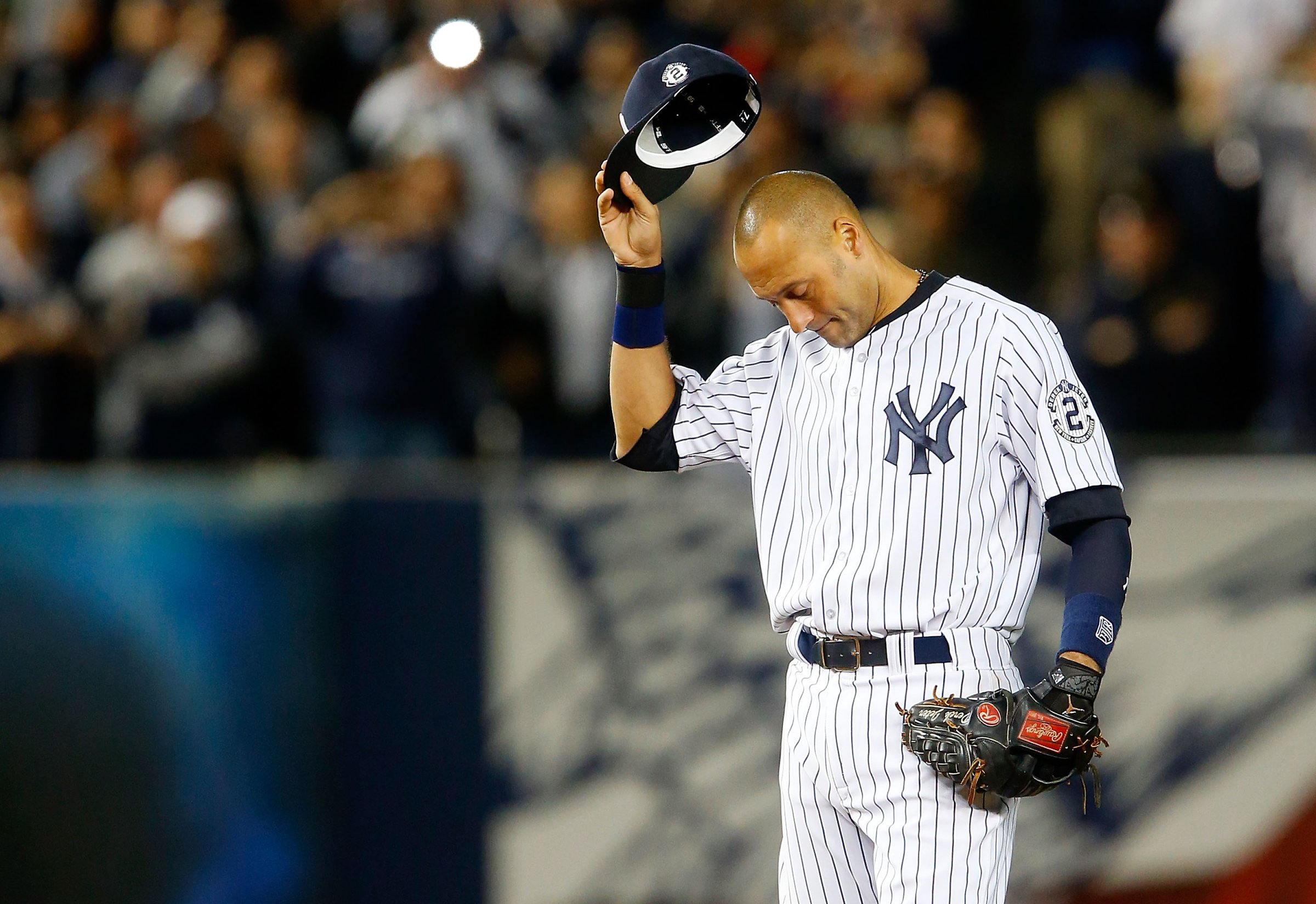
Saints and sluggers have something in common: For canonization or Hall of Fame membership, the Roman Catholic Church and Major League Baseball have five-year waiting periods. Yet recently, Pope Francis waived the five-year rule to name two of his predecessors, John XXIII and John Paul II, as saints. That makes me ask if the Baseball Writers of America voters can sit around until 2019 to elect Derek Jeter to the Hall of Fame. They might just approve him by acclimation on Sunday, when he ends his career in New York Yankee pinstripes with a game at Boston’s Fenway Park.
Jeter, who on Thursday put a pretty bow on a storied 20-year career at Yankee Stadium by hitting a game-winning RBI single, has the credentials to be a first-ballot Hall of Famer. But given the rapturous respect — I mean “RE2PECT” — poured this year on the man who wears No. 2, I also have to ask whether Pope Francis should also become involved in honoring him. Derek Jeter for sainthood?
Ever since spring training, when Jeter announced he would retire at the end of the season, rival teams have lined up to shower him with farewell presents. (Famed Yankee closer Mariano Rivera got the same treatment last year when he called it quits.) This gifts-for-the-baby-Jesus fealty suggested that his preternatural skills needed to be acknowledged with a six-month love-in from ex-Presidents and fans alike. In July in Arlington, Tex., where George W. Bush gave Jeter a pair of cowboy boots, two pilgrims in the stands lofted a sign reading, “We drove 1,152 miles to say goodbye to the Captain!” For the last month, all Yankees uniforms have sported a “2” patch, normally reserved to pay tribute to deceased teammates; yet Jeter is not only not dead yet, he’s still playing for the Yankees. And on Thursday, when Jeter’s final home game was threatened to be rained out, NBC Sports’ Craig Calcaterra wondered “if it’s God crying because He will no longer be able to see Derek Jeter play.” (God relented and the game was played.)
(READ: Sean Gregory on Baseball’s Derek Jeter problem)
For candidates for canonization, the Catholic Church requires “evidence” of two “miracles.” Jeter’s got plenty of those. We’ll make do with five.
Oct. 9, 1996: The homer that wasn’t. In Jeter’s first full year, the Yankees reached the playoffs against the Baltimore Orioles and were trailing 4-3 in the eighth inning when Jeter hit a fly ball to right field. 12-year-old fan Jeffrey Maier reached out and grabbed the ball that outfielder Tony Tarasco was about to catch; umpire Rich Garcia ruled the Jeter bash a home run — this long before Instant Replay allowed for the overturning of a bad call — and the Yankees won the game in extra innings. Eventually they took their first World Series in 18 years, aided by a Jeter pop fly in Game 6 that would have been caught if another umpire hadn’t collided with Atlanta outfielder Jermaine Dye. (God works in mysterious ways.) With Jeter at shortstop, and a lot of other exceptional players on the team, the Yanks won four World Series in five years.
Oct. 13, 2001: The flip play. The Oakland A’s had won the first two of a five-game playoff series against the Yankees; one more victory and they would advance to the league championship round. With New York nursing a 1-0 lead in the seventh inning, and Jeremy Giambi on first base for the A’s, Terrence Long hits a double to right field, the lead-footed Giambi lumbers toward home — and Jeter . . . Sorry, but as a lifelong A’s fan I can barely think about this moment, let alone describe it. Watch, if you must, the “iconic flip” here. Undoubtedly a great play, it helped the Yankees win that game. Of course they took the next two, proceeding to the World Series and sending the A’s home.
(READ: Corliss on his favorite team, the A’s)
Jul. 1, 2004: The dive into the stands. Game tied, top of the 12th inning, and the hated rival Red Sox threatening with men on second and third. Trot Nixon hits a pop fly near the foul line that a hustling Jeter catches, his momentum carrying him three rows into the sideline stands and earning him severe scratches and bruises. His catch saved two runs, and while he was on the way to a hospital, the Yanks won in the 13th. “Jeter, of course, scared the hell out of everybody,” said Yankee manager Joe Torre. “Hopefully, he’ll be all right.” He was, though fans overrated the strategic importance of the catch: the Yanks were 7½ games ahead of the Red Sox that day. In the playoffs, Boston would rally from a three-game deficit to beat the New York and win its first World Series in 86 years.
Jul. 9, 2011: The 3,000th hit. Struggling at the plate, his skills publicly mocked by Yankee brass, the 37-year-old made a bold statement by going five-for-five: three singles, a double and, for his 3,000th hit, a home run over the left field wall on a David Price slider. For his fifth hit, he knocked in the winning run in the eighth. “If we didn’t win, it definitely would have put a damper on things,” Jeter said. Yankees 5, Rays 4.
Sep. 25, 2014: The farewell hit. In his final game at Yankee Stadium, which scalpers had made the most expensive regular-season ticket in MLB history, Jeter doubled in a run in the first inning and, in the seventh, reached first on an Orioles error that plated two more. That would have been his final at-bat in the Bronx if Yanks closer David Robertson hadn’t surrendered three runs in the top of the ninth to even the score at 5. In the bottom of the inning, a single and a bunt put the winning run on second for Jeter. Instead of walking him, as conventional strategy dictated, Orioles skipper Buck Showalter (Jeter’s first manager on the Yankees) had reliever Evan Meek pitch to the star. Jeter hit a clean single to right, which scored the winning run. He accepted hugs from current and former teammates, walked out to genuflect at his shortstop position and was lifted to the heavens on a cloud of cheers. Did you see that, Pope Francis?
(WATCH: Jeter’s big hit in his last Yankee Stadium game)
Stephen Colbert used to ask of George W. Bush, “Great President? Or the Greatest President?” That’s the question about Jeter. “New York Yankees manager Joe Girardi will likely play without a shortstop next year,” wrote USA Today’s Mike Foss. “How can you replace the irreplaceable? You can’t . . . The Yankees can never have another shortstop. It wouldn’t be proper.” Hilarious hyperbole aside, the statement is pretty rich because, in the view of the game’s stats mavens, Jeter is a lousy shortstop. His limited range at getting to ground balls has converted many outs to hits, and dragged down his Wins Above Replacement (WAR), the stat that measures a player’s offensive and defensive skills. This year, when the Angels’ Mike Trout leads with a WAR of 8.0, meaning he’s worth eight games above a replacement player, Jeter’s is a pathetic 0.1 — the lowest of any regular player in the major leagues.
“How are the Yankees going to fill the void left by Derek Jeter?” Jack of Toronto sarcasticated on David Schoenfield’s ESPN Chat Wrap a few weeks ago. “There aren’t a lot of SS out there who can hit an empty .270 and have the defensive range of a statue. hmmm. Maybe they could just put a statue of him at SS, and hope no one notices the difference.” Schoenfield added: “But statues clearly lack leadership skills and fist-pumping ability!”
Leadership skills mean a lot, though the taciturn Jeter leads by example. And if clubhouse inspiration is supposed to translate into championships, his has got rusty in the past 14 years — the Yanks have won only one World Series since 2000, and haven’t earned a playoff spot since 2012. But I’m not going to take sides in the great debate: Jeter H. Christ vs. the Jeter Beaters. For opposing views from ESPN pundits, listen to Colin Cowherd on Jeter’s lasting value, and watch Keith Olbermann take a dump on No. 2. I’ll just say this: For much of his career, Jeter was an excellent offensive player on an excellent team (1996-2001); then he was a very good player on an underachieving team of big stars; and at the end he hung around as one of the least productive players at his position. That seem fair?
The real Jeter magic was his aura. He carried himself with poise; he was the charmed son of interracial parents (father black, mother white, Derek mauve) who this season could be seen at nearly every game rooting for their lad. A master at withholding emotions, he managed to give 20 years of post-game interviews without saying anything controversial — in fact, anything at all. That is a stunning accomplishment in an age of blab-your-brains-out social media. He was never tainted with taking performance-enhancing drugs in a baseball era stained by steroids. And he gave the impression of being a team-first guy, less interested in personal stats than in extending the bountiful legacy of the New York Yankees.
(WATCH: Derek Jeter in his final All-Star Game)
In other words, he wasn’t A-Rod.
Every saint needs a devil, and Alex Rodriguez was perfectly cast as Jeter’s evil twin. A year, a month and a day younger than Jeter, Rodriguez had far more impressive talents of offensive power and defensive range. First for the Seattle Mariners, then the Texas Rangers and, in 2004, the Yankees, A-Rod made a strong case for being among the game’s very best. On the all-time top-50 list of best WAR years, the only two active players are Trout (with 10.9 in 2012) and Rodriguez (10.3 in 2000); and A-Rod had three other finishes in the top 100. (Jeter’s best WAR year, an 8.0 in 1999, lands him in a tie for 264th.) He also enjoyed a Jeterian magic moment of his own: On the last day of the 2009 regular season — the year he helped the Yankees win their only World Series since 2000 — Rodriguez hit two homers and drove in seven runs, all in one inning, thereby extending his record of 30 homers and 100 RBIs to 12 seasons.
Rodriguez and Jeter had been friends from their teens, but the bromance soured into a no-mance by the time A-Rod joined the Yankees. Superior to Jeter at shortstop (a factor that contributed to his high WAR), he didn’t grouse when Torre shifted him to third base so Jeter could stay put. Ian O’Connor’s Jeter biography, The Captain, implies that A-Rod was frozen out of the Yankee clubhouse by a veteran who wanted to make sure the new guy remained an untrusted outsider.
Rodriguez earned a rep for wilting in the playoffs, though his postseason on-base and slugging percentages are nearly identical to Jeter’s. Then there’s the quite plausible theory that A-Rod is a jerk — playing for himself more than for the team, ignoring the Yankee staff and fans, dallying with Madonna and other naughty ladies, commissioning a portrait of himself as a centaur. Last year Rodriguez was banned from baseball for 211 games for taking horse pills human growth hormones.
(WATCH: TIME’s Sean Gregory on A-Rod and steroids)
I have a little sympathy for the devil. He was hot to Jeter’s cool, sometimes pretzeled by pressures Jeter either never felt or never showed. I think A-Rod needed love but didn’t know how to earn it — whereas Jeter seemed not to need love, yet got it from everyone. I wonder where Rodriguez was on the night of Jeter’s Yankee Stadium farewell. He might have wanted to be there, for the pleasure of offering a younger-brother hug, and for the sad realization that, when he returns to the Yankees after his suspension is lifted next year, many fans will pummel him with boos. “A-Roid!”
Playing out the last three years of baseball’s highest-paid contract won’t be fun for Rodriguez; there’ll be no shots of his parents smiling in the luxury boxes. But it will bring a new kind of excitement to the Stadium: not the sanctified Jeter valediction, more a crackling tension before the expected explosion — tape-measure home run or emotional blowout. And I’ll bet you this: A-Rod, if he’s clean and healthy, will have a more productive 40th year than Jeter did, with a higher WAR than 0.1. Saint Derek was so 2014; it’s time for the devil to get his due.
The Captain Says Goodbye to Yankee Stadium
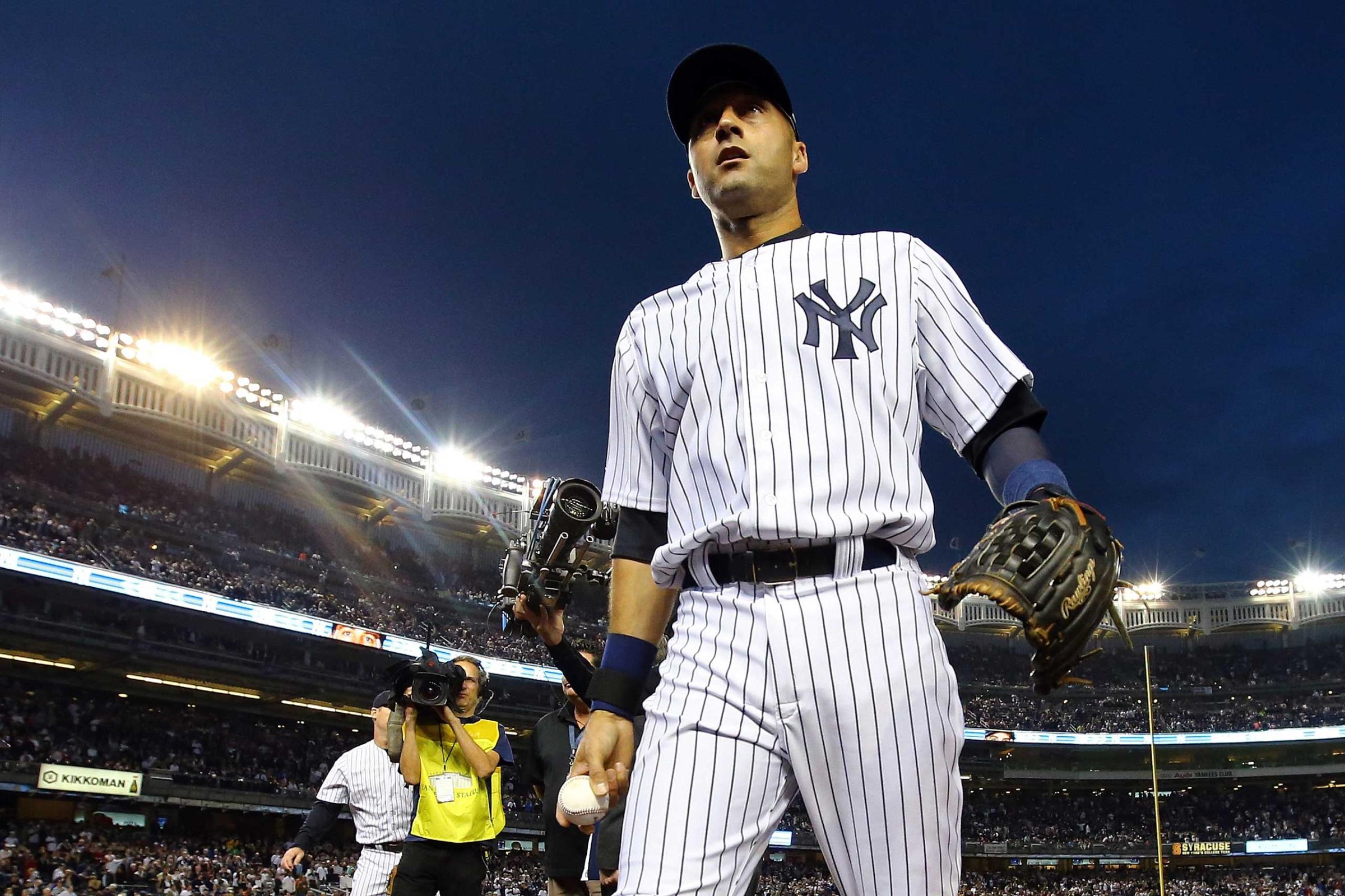
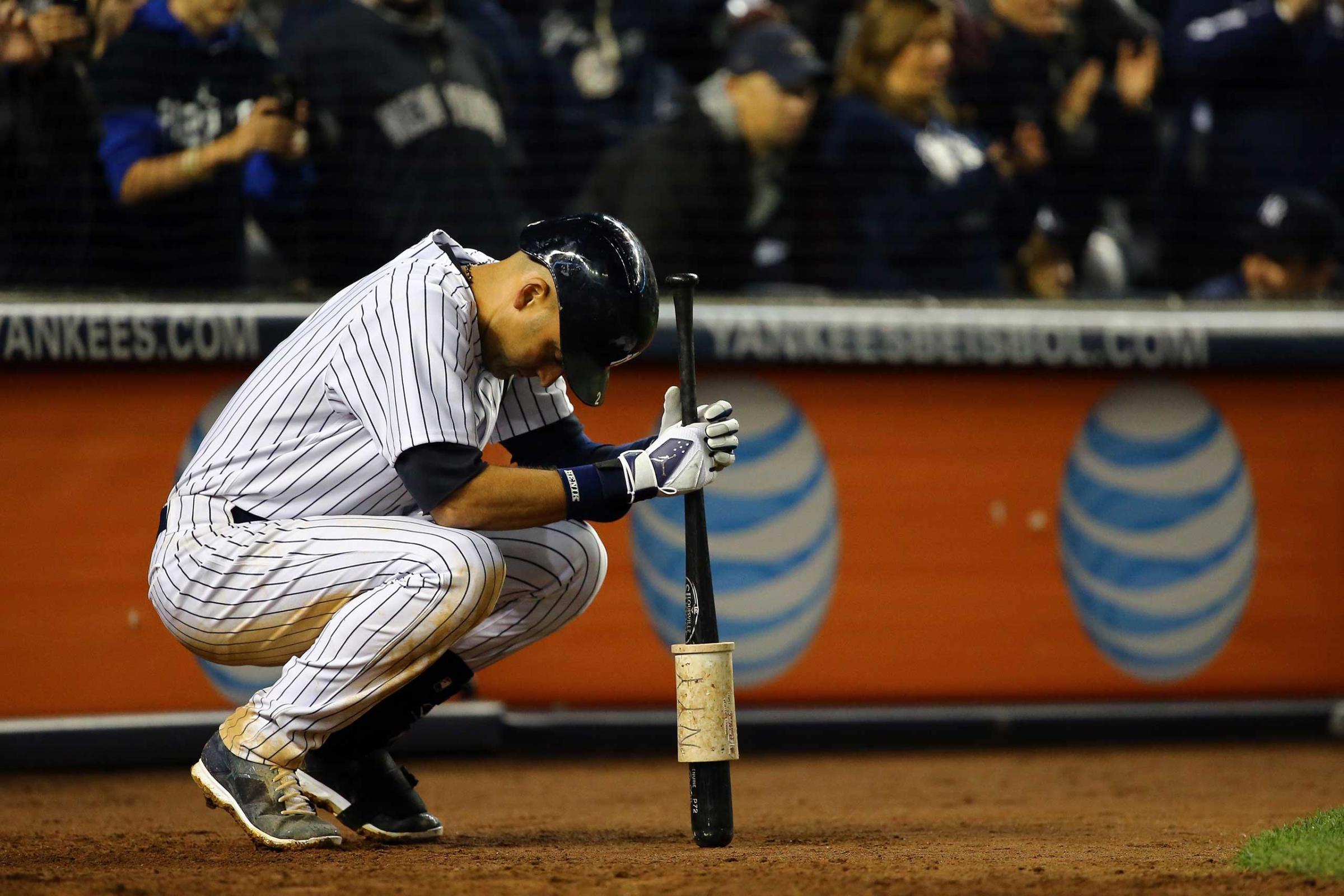
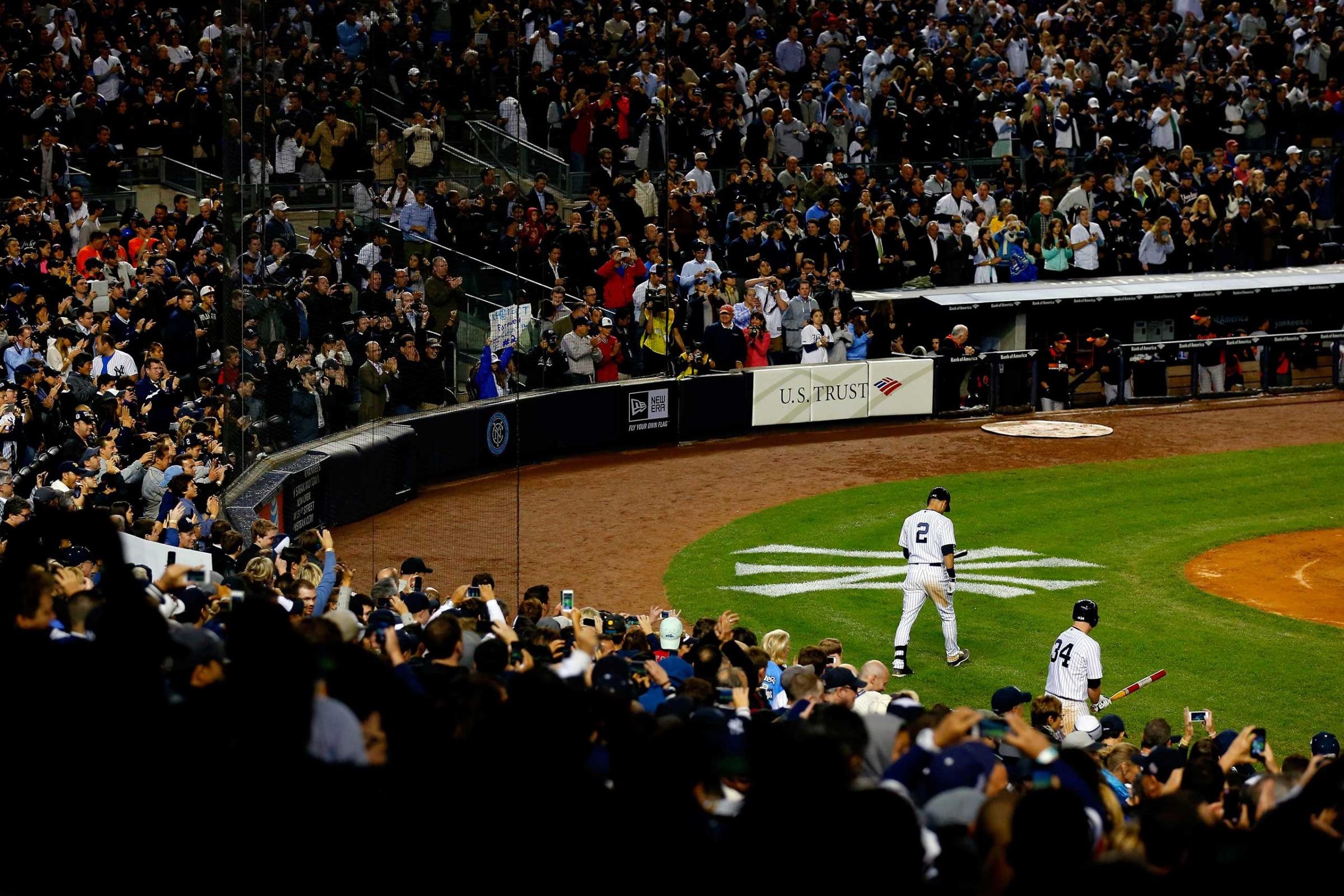
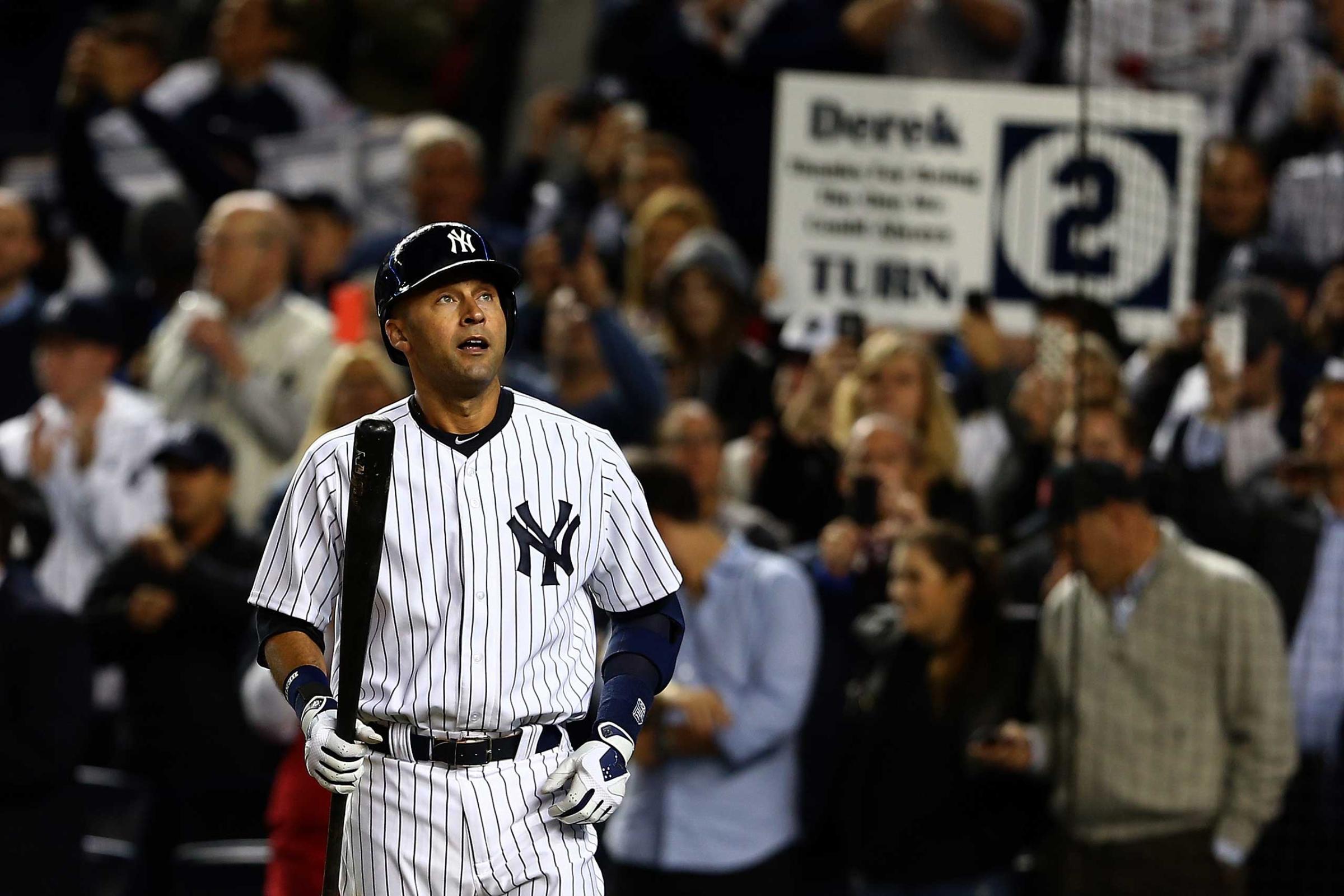
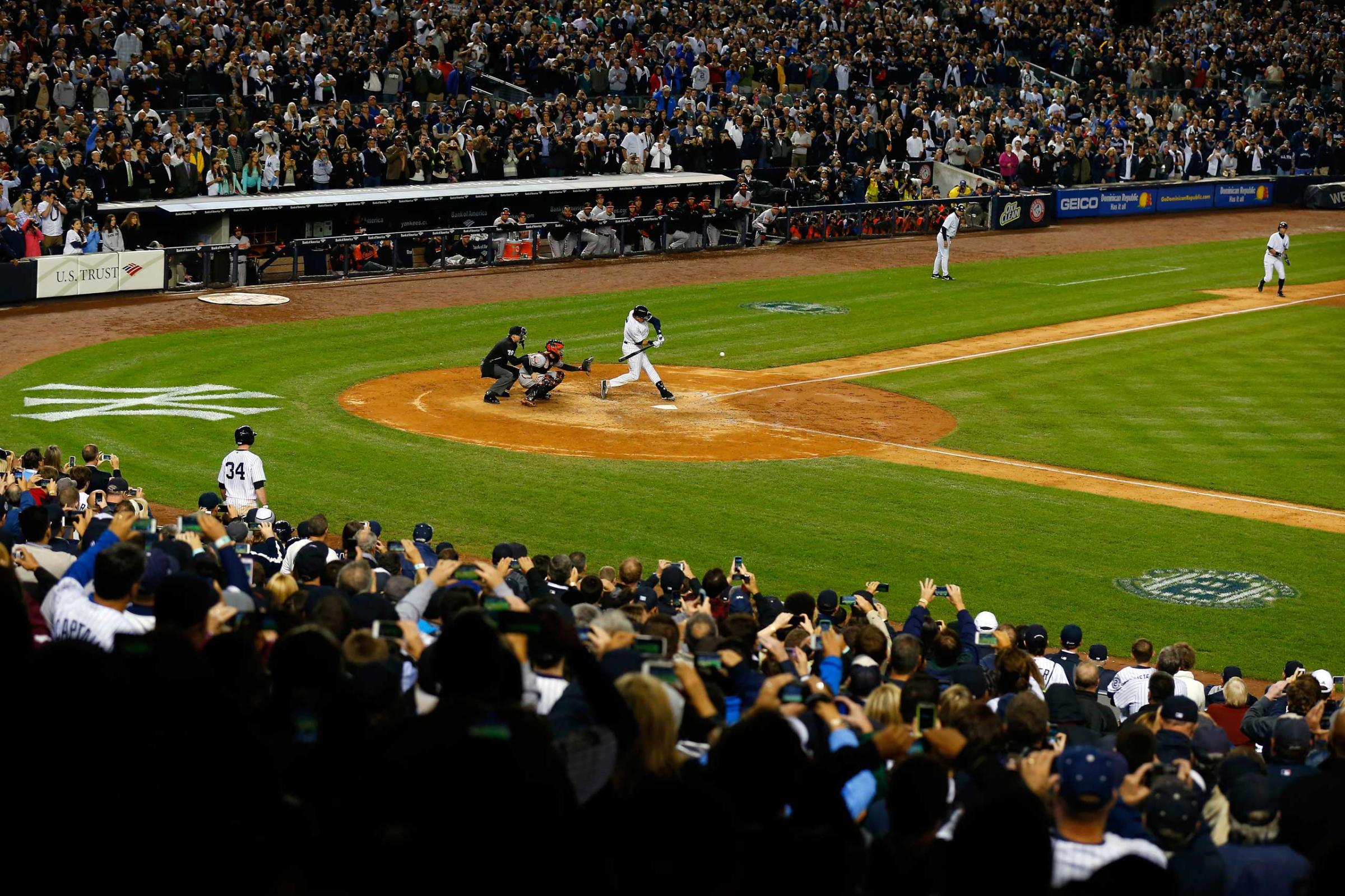
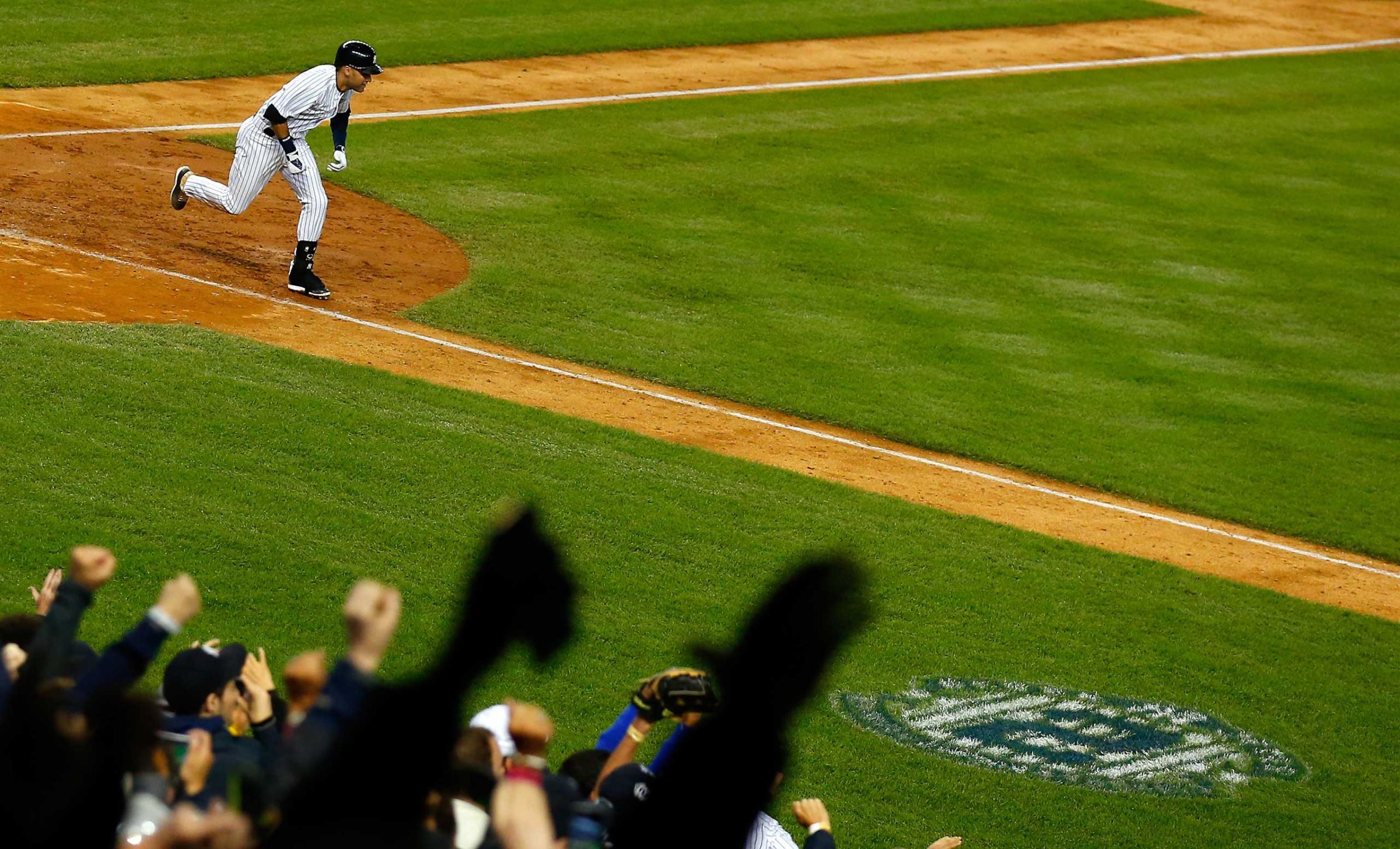
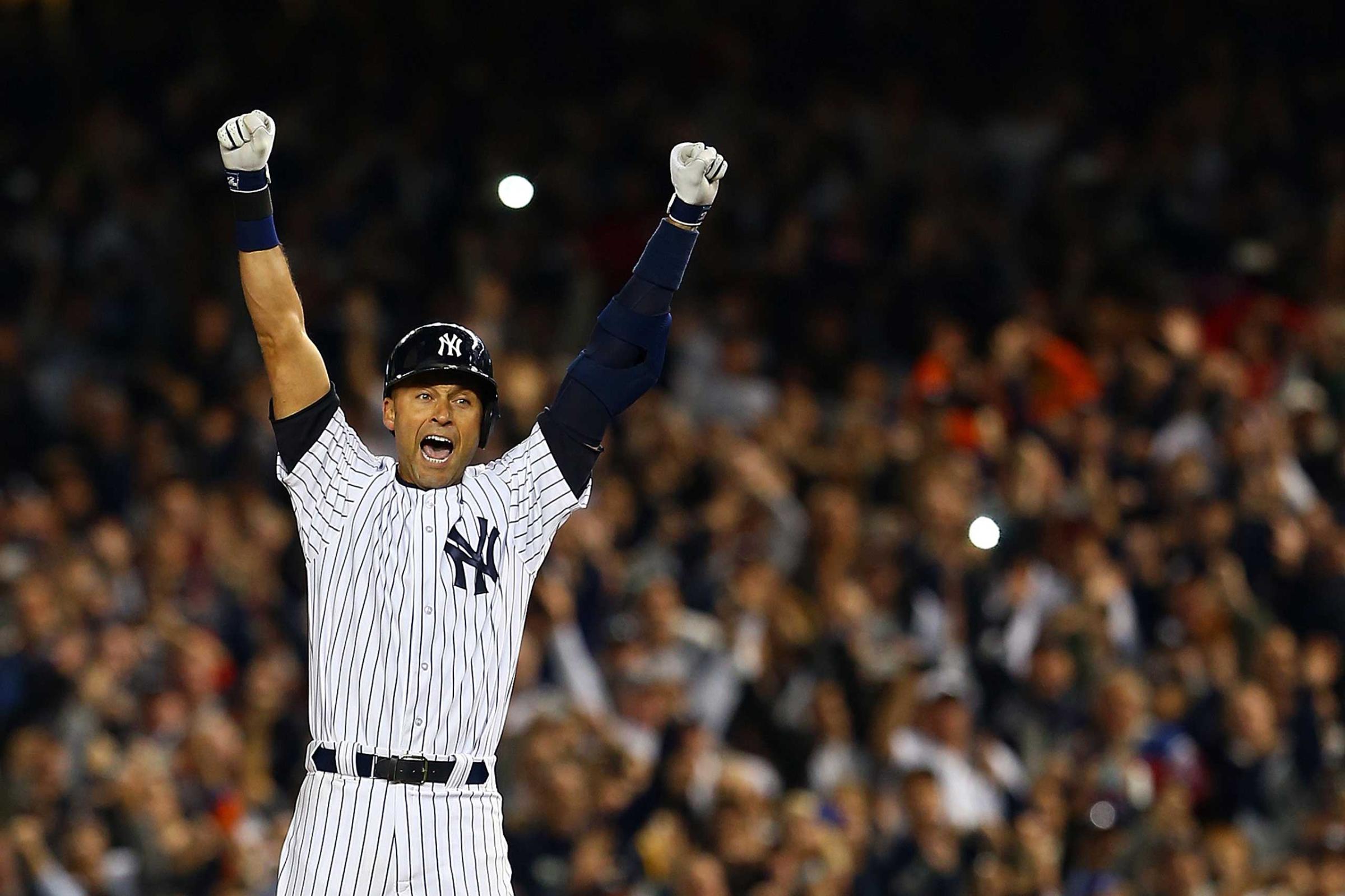
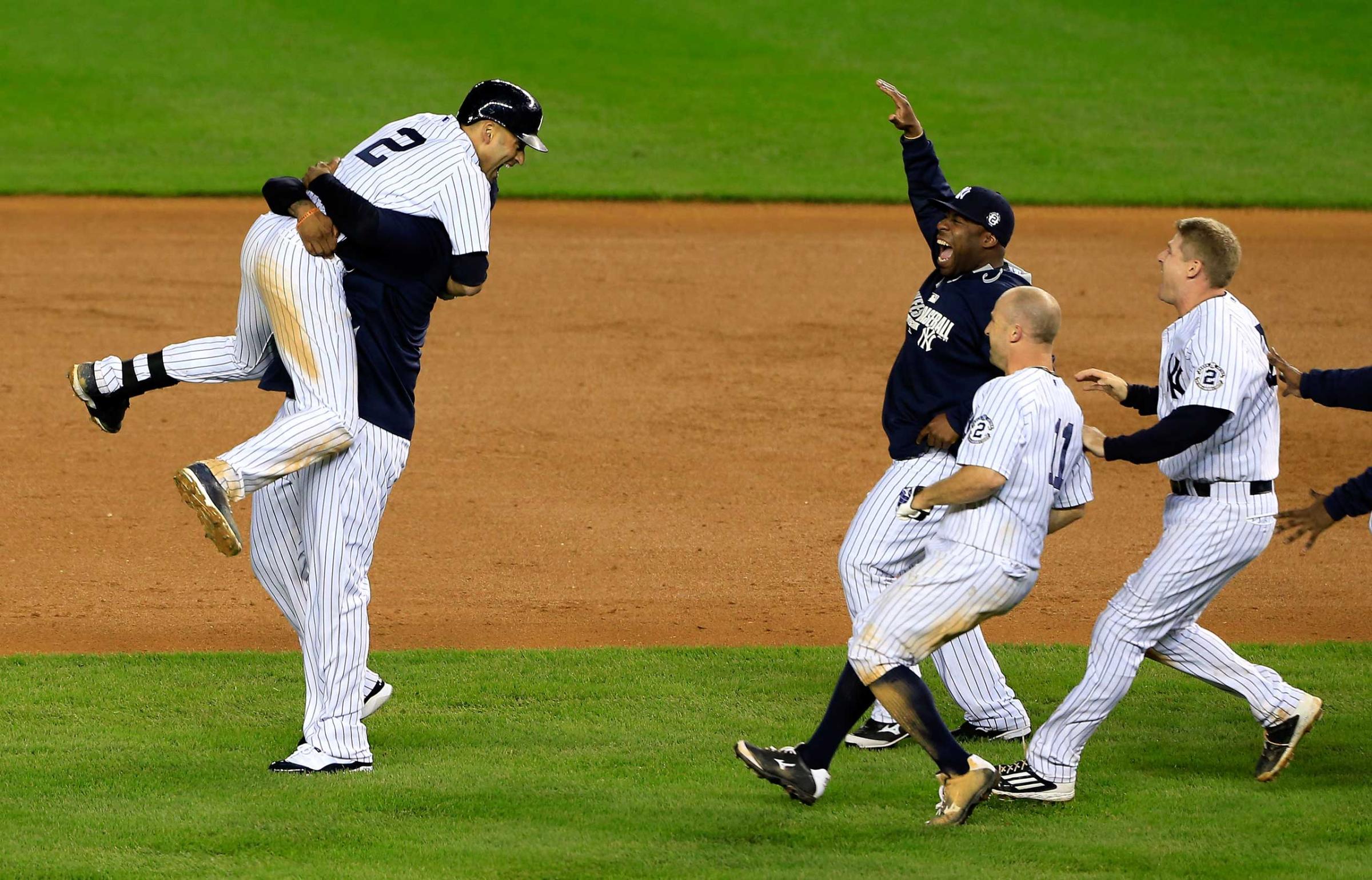
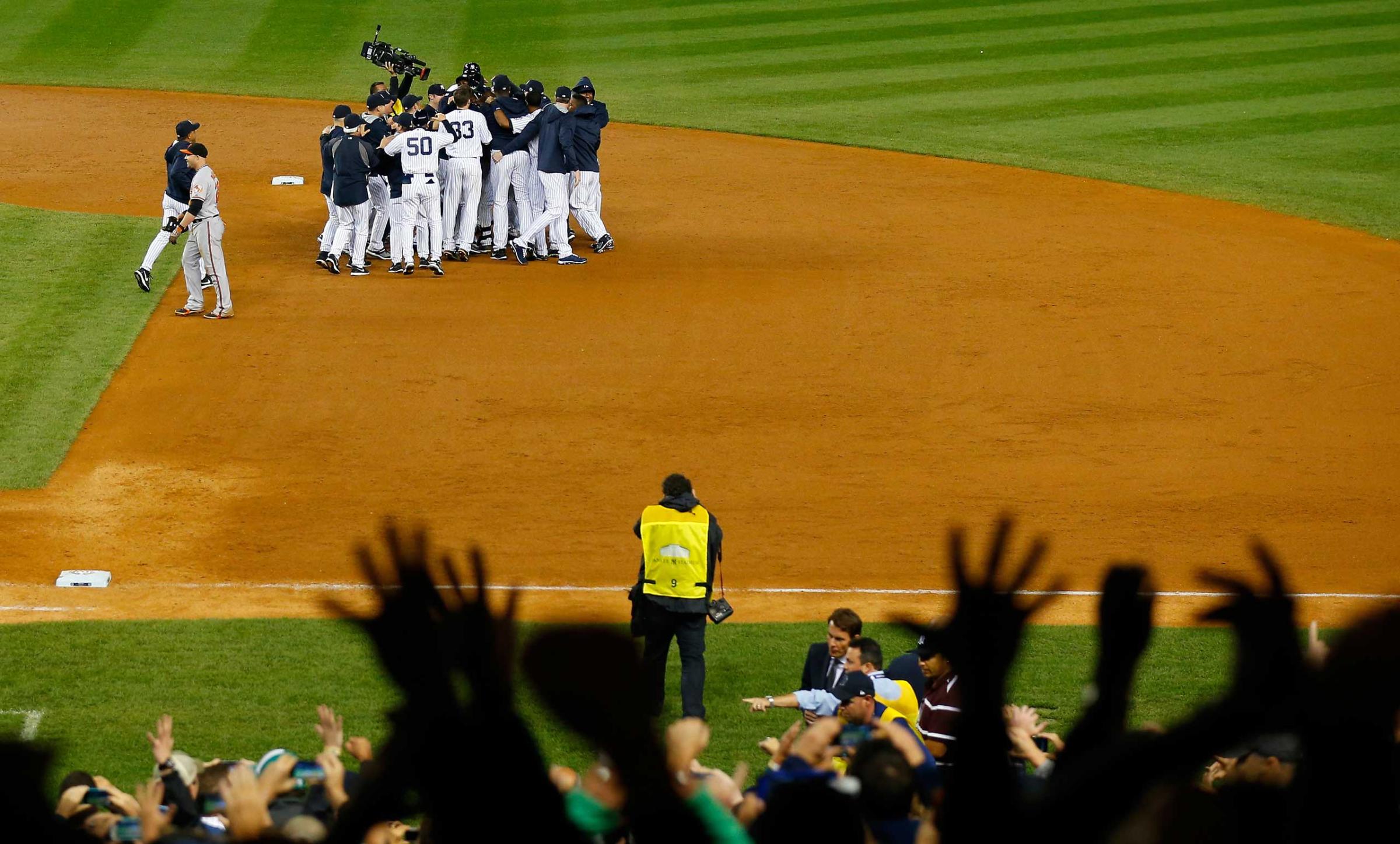
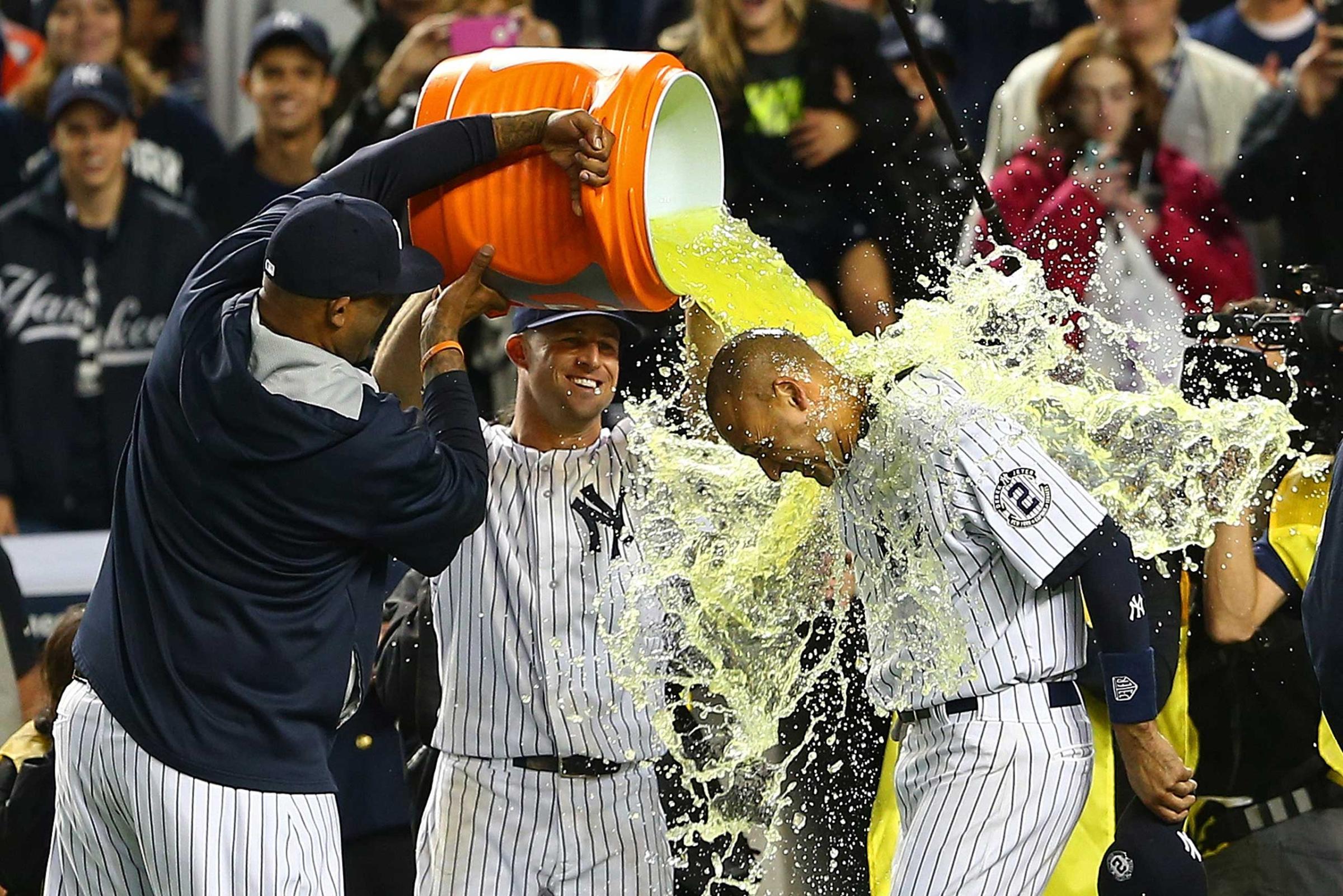
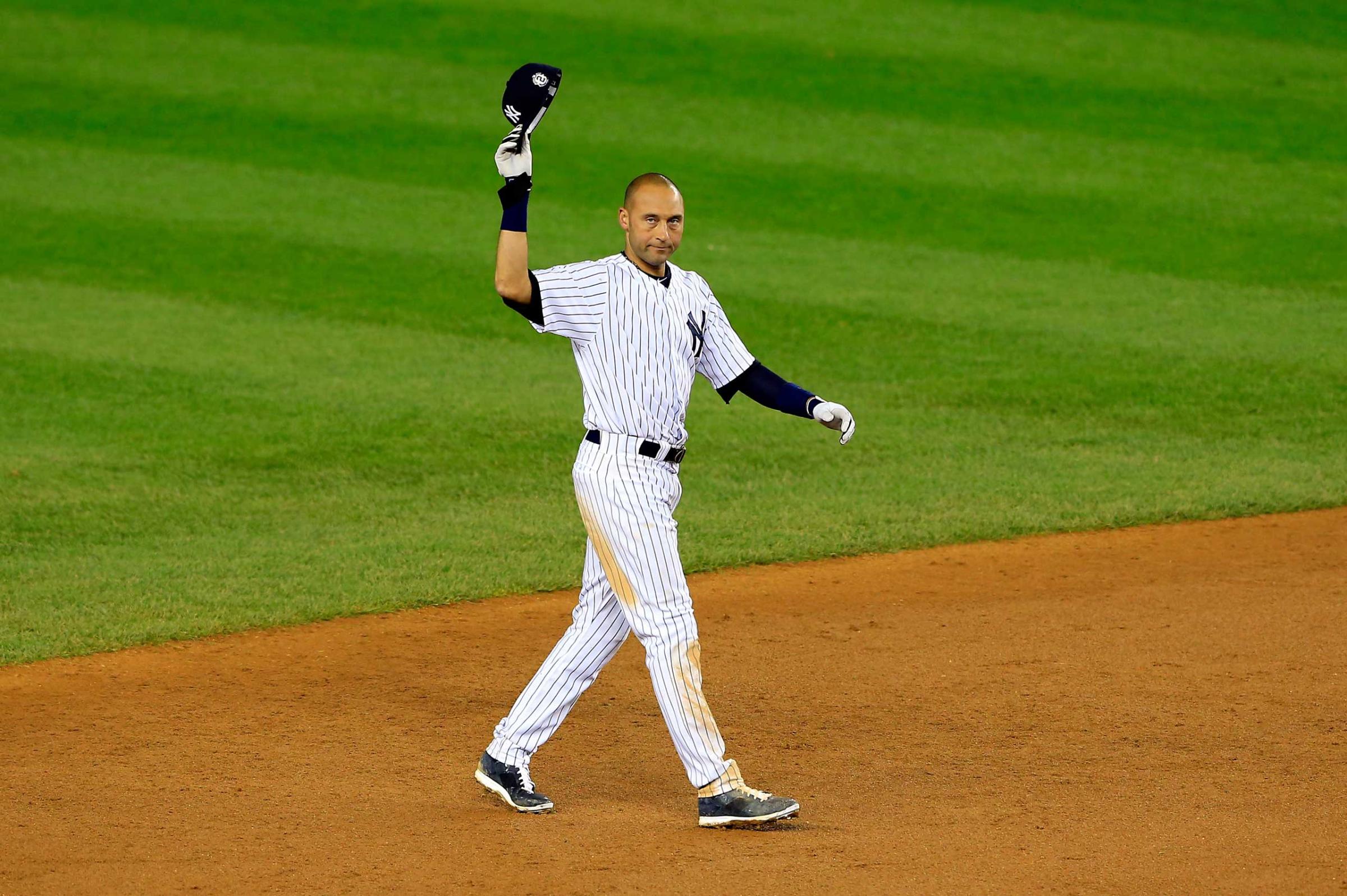
More Must-Reads from TIME
- Cybersecurity Experts Are Sounding the Alarm on DOGE
- Meet the 2025 Women of the Year
- The Harsh Truth About Disability Inclusion
- Why Do More Young Adults Have Cancer?
- Colman Domingo Leads With Radical Love
- How to Get Better at Doing Things Alone
- Michelle Zauner Stares Down the Darkness
Contact us at letters@time.com